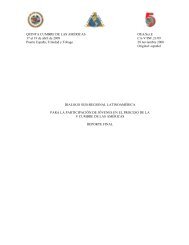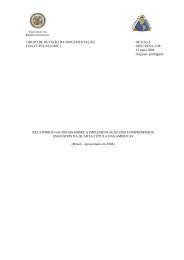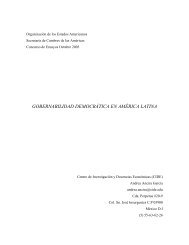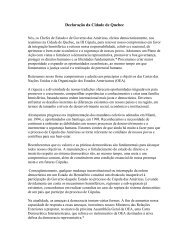The Road to Hemispheric Cooperation: Beyond the Cartagena
The Road to Hemispheric Cooperation: Beyond the Cartagena
The Road to Hemispheric Cooperation: Beyond the Cartagena
You also want an ePaper? Increase the reach of your titles
YUMPU automatically turns print PDFs into web optimized ePapers that Google loves.
Opportunities for <strong>Cooperation</strong> in Innovation with <strong>the</strong><br />
United States<br />
Fruitful initiatives and important collaboration are already<br />
taking place between <strong>the</strong> United States and several countries<br />
(United States and Brazil, United States and Chile,<br />
Canada and Brazil, <strong>to</strong> name a few). Most recently <strong>the</strong><br />
United States and Brazil reaffirmed <strong>the</strong>ir commitment <strong>to</strong><br />
“recognize <strong>the</strong> importance of science, technology and innovation.”<br />
In March 2012, <strong>the</strong> U.S.-Brazil Joint Commission<br />
Meeting on Science and Technology (originally created<br />
in 1984) agreed <strong>to</strong> expand initiatives in a wide range<br />
of areas <strong>to</strong> include: streng<strong>the</strong>ned ecosystem, ocean science<br />
and space wea<strong>the</strong>r research; collaboration on nanotechnology<br />
development; managing and moni<strong>to</strong>ring of<br />
natural disasters; and improved measurement standards<br />
for biofuels. <strong>The</strong>y also agreed <strong>to</strong> expand academic and<br />
research partnerships in health science, with particular<br />
focus on influenza, HIV/AIDS and <strong>the</strong> prevention of noncommunicable<br />
diseases. In each of <strong>the</strong>se areas, existing<br />
ministries, national institutes and working groups and <strong>the</strong><br />
private sec<strong>to</strong>rs (as feasible) will work <strong>to</strong>ge<strong>the</strong>r <strong>to</strong> develop<br />
and encourage information sharing, shared access <strong>to</strong> user<br />
facilities, exchange of students, scientists and scholars,<br />
and joint research projects. Aspects of this arrangement<br />
can be found in o<strong>the</strong>r science and technology agreements<br />
in<strong>to</strong> which <strong>the</strong> United States has entered, including with<br />
Chile (1992), Colombia (2010) and Uruguay (2008).<br />
Thus is appears likely that an expanded agenda that seeks<br />
<strong>to</strong> foster mutually advantageous cooperation in innovation<br />
in <strong>the</strong> Americas could be developed in <strong>the</strong> following areas,<br />
among o<strong>the</strong>rs:<br />
●● Streng<strong>the</strong>ning cooperation on science, technology, and<br />
education. It would desirable <strong>to</strong> deepen and expand joint<br />
initiatives on research and development projects in areas<br />
such as ICT, agriculture, green technologies and nanotechnology,<br />
<strong>to</strong> name a few.<br />
●● Encouraging cooperation among universities focused<br />
on innovation and technology. <strong>The</strong>se efforts should be<br />
geared <strong>to</strong>ward promoting two-way work internships and<br />
higher education exchanges, particularly between research<br />
and higher education institutions in <strong>the</strong> fields of<br />
science, technology, environmental studies and math.<br />
●● Improving collaboration and technical assistance directed<br />
<strong>to</strong>ward streng<strong>the</strong>ning <strong>the</strong> competitiveness of small and<br />
medium enterprises, including <strong>the</strong>ir technological upgrading<br />
and use of ICT <strong>to</strong> increase productivity.<br />
●● Fostering <strong>the</strong> competitiveness and internationalization of<br />
firms, particularly small and medium-sized enterprises<br />
(SME), by promoting alliances between firms from <strong>the</strong><br />
LAC countries and <strong>the</strong> United States, paying particular attention<br />
<strong>to</strong> <strong>the</strong> accession of SMEs <strong>to</strong> regional value chains.<br />
Endnotes<br />
1 Economic Commission for Latin America and <strong>the</strong> Caribbean<br />
(ECLAC), Preliminary Overview of <strong>the</strong> Economies of Latin America<br />
and <strong>the</strong> Caribbean, 2011 (Santiago, Chile: United Nations,<br />
2011).<br />
2 ECLAC, Social Panorama of Latin America and <strong>the</strong> Caribbean,<br />
2011 (Santiago, Chile: United Nations, 2011). See also ECLAC,<br />
Time for Equality: Closing gaps, Opening Trails (Santiago, Chile:<br />
United Nations, 2010).<br />
3 ECLAC, Foreign Direct Investment in Latin America and <strong>the</strong><br />
Caribbean, 2011 (Santiago, Chile: United Nations, 2012).<br />
4 ECLAC, Broadband for Development and Inclusion, document prepared<br />
for <strong>the</strong> Sixth Summit of <strong>the</strong> Americas, <strong>Cartagena</strong>, Colombia<br />
(Santiago, Chile: United Nations, 2011); ECLAC, ICT for Growth<br />
and Equality: Renewing Strategies for <strong>the</strong> Information Society,<br />
Third Ministerial Conference on <strong>the</strong> Information Society in Latin<br />
America and <strong>the</strong> Caribbean, Lima, Peru (Santiago, Chile: United<br />
Nations, 2010); ECLAC and Secretaría General Iberoamericana<br />
(SEGIB), Espacios Iberoamericanos: La economía del Conocimien<strong>to</strong><br />
(Santiago, Chile: United Nations, 2008).<br />
5 ECLAC, Structural Change and Productivity Growth—20 Years<br />
Later: Old Problems, New Opportunities (Santiago, Chile: United<br />
Nations, 2008); ECLAC, Globalization and Development (Santiago,<br />
Chile: United Nations, 2002).<br />
6 ECLAC, Structural Change and Productivity Growth – 20 Years<br />
Later, 2008.<br />
7 For more information regarding innovations surveys throughout<br />
<strong>the</strong> region, please see: ECLAC, Structural Change and Productivity<br />
Growth 20 Years Later, 2008.<br />
8 In preparation for <strong>the</strong> Sixth Summit of <strong>the</strong> Americas, <strong>the</strong> Government<br />
of Colombia requested that ECLAC prepare inputs on<br />
access and use of technologies, with particular concern with<br />
broadband use. See ECLAC, Broadband for Development and<br />
Inclusion, 2011.<br />
<strong>The</strong> <strong>Road</strong> <strong>to</strong> <strong>Hemispheric</strong> <strong>Cooperation</strong>: <strong>Beyond</strong> <strong>the</strong> <strong>Cartagena</strong> Summit of <strong>the</strong> Americas<br />
<strong>The</strong> Brookings Institution ❘ Latin America Initiative<br />
19








